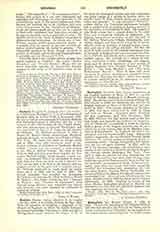

Bedingfaid, FRANCES (alias LONG) superioress of the English Institute of Mary, b. 1616 of a gentle family of Norfolk, England; d. at Munich. Germany, 1704. She and her eleven sisters entered religious life. Sent abroad to finish her education, she entered the English Institute of Mary at Munich and was professed in 1633. This society, founded at St. Omer in 1603, had been transferred in 1629 to Liege and then to Munich. Frances’s sister Winefrid, the first superioress, died 26th December, 1666. In 1669, Frances, who had become head of the Munich house, was induced by Catherine of Braganza, wife of Charles II, to establish a house in London. With a group of the English members she set up a school for young women, first at St. Martin‘s Lane, then at Hammersmith. In England, she wore a secular garb, and was known as Mrs. Long. Summoned before a magistrate, she was liberated through family influence, but warned against harboring priests or instructing youth. Though disregarding this injunction, she was not again molested. In 1677, with the aid of Sir Thomas Gascoigne, she established a community in the north, in a house on the site of the present convent, outside Micklegate Bar, York. From 1677 to 1686 she divided her time between her two English communities, but after 1686, having transferred the care of the Hammersmith house to Mrs. Cicely Cornwallis, she remained at York. In her seventy-eighth year, after her house had been repeatedly searched and threatened with destruction, she, with her niece, Mother Dorothy Paston Bedingfeld, was summoned before the Mayor of York and committed to Ousebridge Gaol. Released soon afterwards, she was again attacked, and in 1695 her house barely escaped destruction. In 1699, resigning in favor of her niece, Mother Bedingfeld returned to Munich and died there, one year after the rule of her institute had been approved by Clement XI.
J. VINCENT GOWNE

